Sponsored
Helping to End HIV in the U.S. starts in the Southern States
5 Years of Impact from the Gilead COMPASS Initiative®
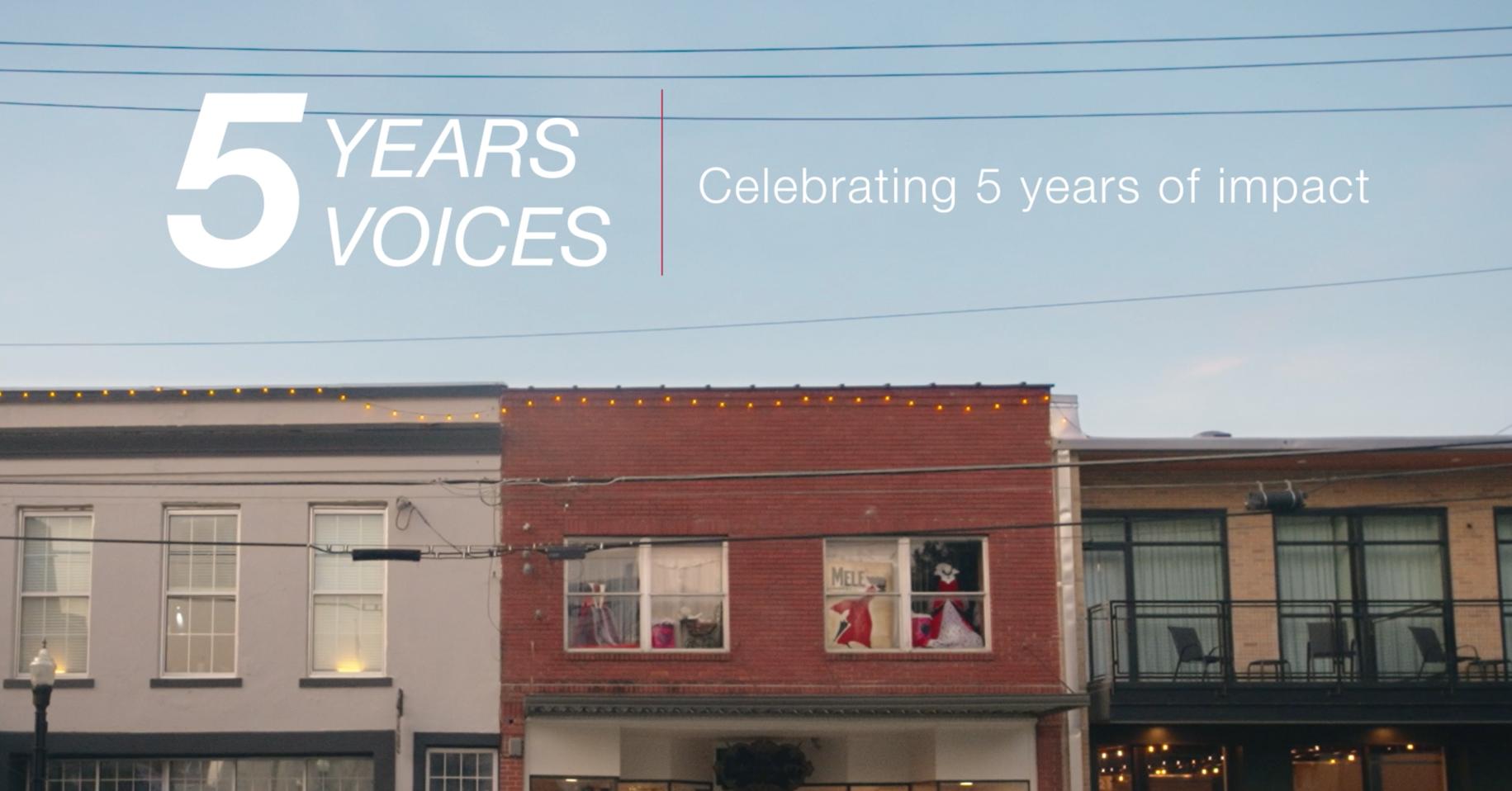
By Shanell McGoy | ATLANTA – It’s 2023, and HIV is still a public health crisis in the United States. Despite being preventable due to PrEP medicines, the disease continues to impact communities across the country, disproportionately affecting vulnerable individuals in the Southern states. Home to just more than one-third of the population, the Southern states account for 51% of new HIV diagnoses.
Of the 1,055,603 people living with HIV in the U.S. in 2020, 46% (481,815) were in the U.S. South, a number higher than the entire population of Atlanta. More than 65% of them are people of color. As the epidemic continues to affect Southern communities despite medical advances in prevention and treatment, it is clear that the factors perpetuating the epidemic are no longer medicinal but structural and social.
Launched in 2017, the Gilead COMPASS Initiative® – a 10-year, more than $100 million commitment to support organizations working to address the HIV/AIDS epidemic in the Southern United States – is trying to address these factors.
COMPASS was born out of a listening and learning tour that Gilead conducted throughout the South to meet with those most directly affected by HIV and determine the most effective approach to addressing the vast health inequities barring access to care. The commitment’s ethos is rooted in the belief that the best ideas to end the epidemic come from the creativity and resilience of people on the frontlines – those who are daily tackling the social and cultural complexities that have permitted HIV to endure for far too long.
By collaborating with regional groups and community members, COMPASS empowers local organizations to directly address the systemic barriers that contribute to regional and cultural HIV disparities and stigma. COMPASS provides local organizations with the resources they need to tackle the structural and social barriers that stand in the way of one day making the end of this epidemic a reality.
Five years later, the initiative has awarded approximately 400 local organizations providing HIV care and services and built partnerships with nationally recognized groups such as GLAAD and the Southern HIV Impact Fund to combat stigma through capacity-building training and targeted public relations campaigns. With the help of coordinating centers Emory University Rollins School of Public Health, Southern AIDS Coalition, University of Houston Graduate College of Social Work and Wake Forest University School of Divinity, COMPASS has reached nearly 300,000 people through funded capacity building training and direct service provision in the Southern US region. Through this work, Gilead remains committed to ending the HIV epidemic in the South and worldwide.
To celebrate the COMPASS fifth anniversary, Gilead is launching 5 Years, 5 Voices, a five-part video series that will feature the stories of COMPASS grantee organizations across the U.S. South and the work they do to remove structural barriers to HIV care and treatment and improve overall health outcomes for underserved populations in their local communities.
The first video highlights COMPASS grantee Central Alabama Alliance Resource and Advocacy Center (CAARAC), a local Alabama organization providing HIV prevention programs and healthcare services to seven of the most vulnerable counties in the state.
Gilead: More than Medicine is part of a paid year-long collaboration between Gilead Sciences and the Los Angeles Blade
WATCH:
Pets
The Melrose Vet: Championing LGBTQ equality while keeping pets healthy and happy
Dr. Grewal is a proud ally
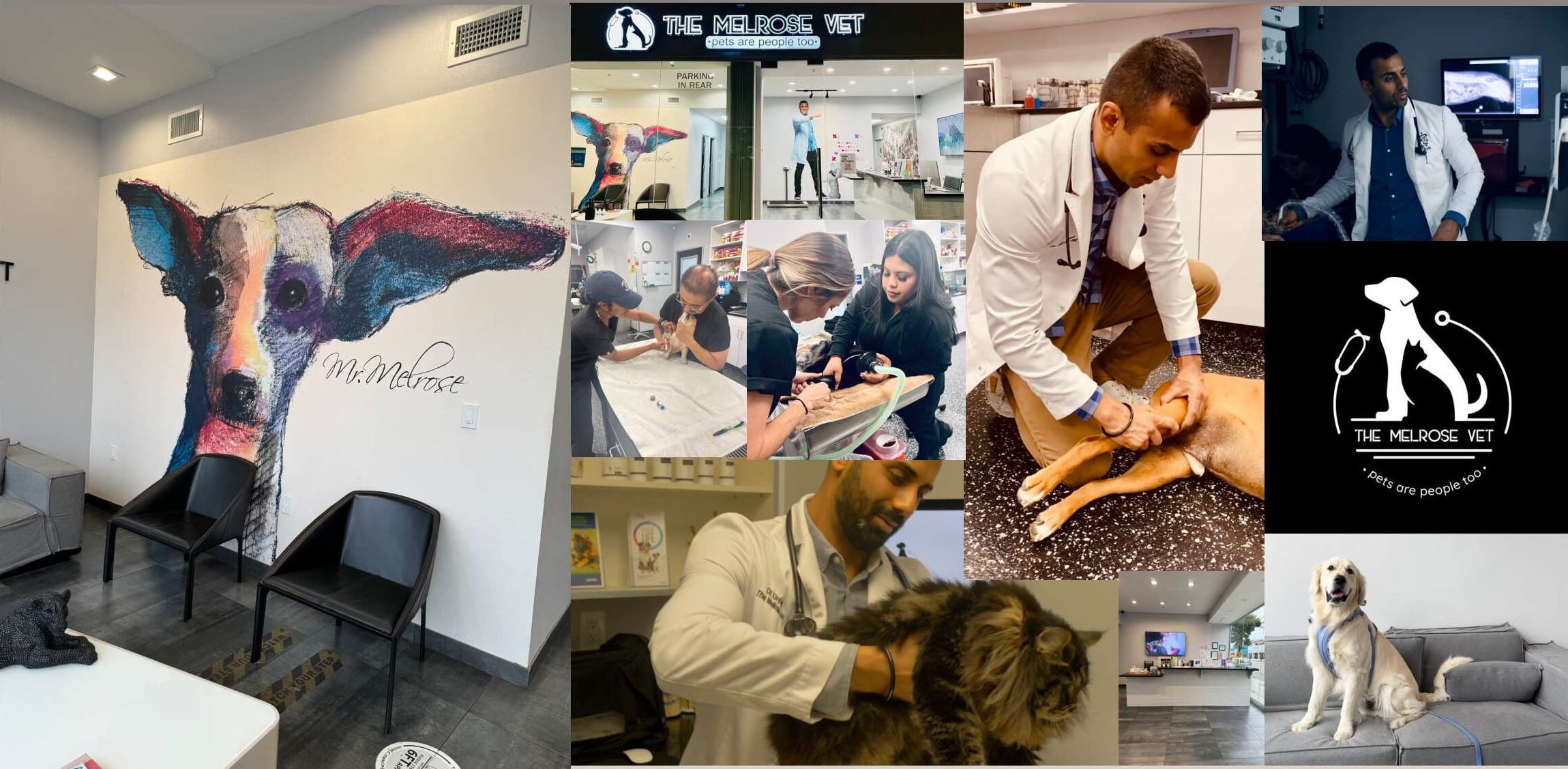
Dr. Grewal, aka The Melrose Vet, is a proud ally of the LGBTQ community and was happy to support the Los Angeles Blade for their Pride events last month.
“At The Melrose Vet, we are committed to fostering an inclusive and welcoming environment for all,” said Dr. Grewal. “As a proud supporter of the LGBTQ community, we believe that every individual deserves to be treated with dignity, respect, and compassion, regardless of their sexual orientation or gender identity. Our clinic is dedicated to creating a safe space where diversity is celebrated, and everyone feels valued and supported.”
Dr. Grewal recognizes the unique challenges faced by the LGBTQ community and strives to ensure that his practice is a place of acceptance and understanding.
“The Melrose Vet stands firmly in support of LGBTQ rights and inclusivity, both within our clinic and in the broader community. We are honored to serve a diverse clientele and are committed to advocating for equality and respect for all.”
He added: “It’s so important — especially for allies — to support the Blade,” said Dr. Grewal. “They are a tireless advocate for the LGBTQ community, and we love working with them.”
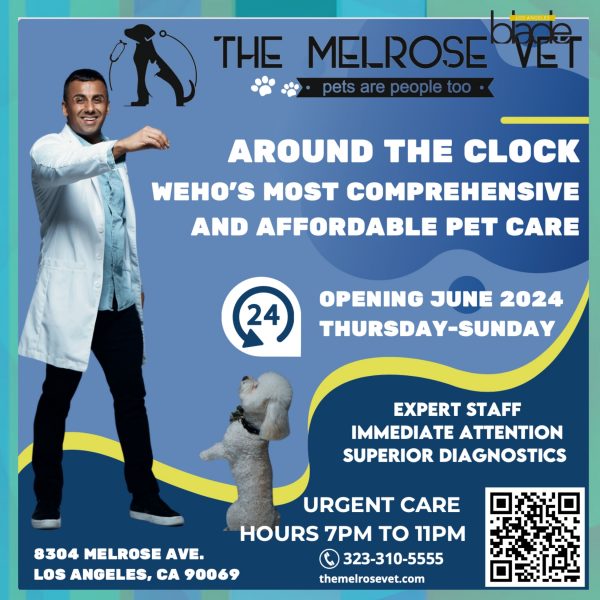
Dr. Grewal recommends that all Blade readers take their pets in for their annual checkups.
“Regular check-ups are essential for early detection and treatment of common pet issues. Don’t hesitate to reach out to your vet if something seems off,” he noted. “Being observant and proactive about your pet’s health can prevent minor issues from becoming major problems. Trust your instincts and seek professional advice when needed.”
Now that we are in the summer months, Dr. Grewal highly recommends you keep your pets well hydrated. “A healthy diet and adequate hydration are crucial for maintaining your pet’s digestive health. Ensure they have access to fresh water and a balanced diet.”
If you can’t make it into his vet office, Dr. Grewal and his experienced team are also mobile vets, bringing their veterinary care directly to your doorstep.
“Traveling to a veterinary clinic can be stressful for pets, especially those who are anxious or have mobility issues. A mobile vet service allows pets to receive care in the comfort of their own home, reducing stress and anxiety. In this way, we can prioritize your pet’s comfort and health by offering personalized attention in the familiar surroundings of your home. This ensures minimal stress for your pets.”
Sponsored
David Vela: Pioneering Inclusive Education and LGBTQIA+ Leadership within the Los Angeles Community College District
David Vela’s journey is a testament to the power of perseverance, advocacy, and community.
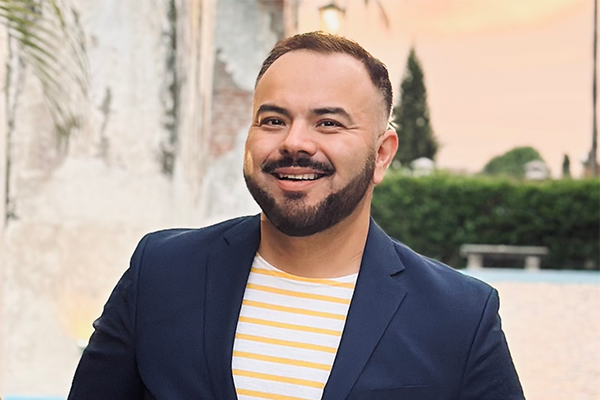
In the diverse landscape of Los Angeles, David Vela emerges as a transformative leader and a symbol of hope for the community. A dedicated member of the Board of Trustees for the Los Angeles Community College District (LACCD), David’s journey is marked by a relentless commitment to giving back to the community that shaped him, advocating for LGBTQIA+ rights, and enhancing the educational environment for all students.
According to David, “it takes an impactful moment in time for people to be really motivated about anything.” At a young age, he did not understand inequality in America, but he noticed the importance of education. David says, “I began this real robust interest in ensuring that people in my community were able to access education.” His first step was entering the field of politics at 13 years old where he held leadership roles in the Associated Student Body (ASB) for four years in high school. David served as the ASB president his senior year, delivering monthly reports to the Board of Education which fueled his interest in leadership, politics, and education.
David received his bachelor’s degree in biological anthropology from UCLA and his master’s from Pepperdine University in public policy. He then pursued a political career and later found himself running for the Montebello Unified School District (MUSD) Board of Education, which was a full-circle moment to have someone from an underrepresented community on the Board.
David attended school within the MUSD where he witnessed his community’s challenges and immense potential. His deep-rooted connection to his hometown of Boyle Heights fueled his desire to make a tangible difference. After becoming a MUSD board member, David was able to implement educational opportunities in a formidable and formal way across the district where he graduated.
David’s presence on the LACCD Board of Trustees is more than just representation; it is a powerful statement of inclusion and advocacy. David was the first LGBTQIA+ and multicultural individual who ran for office, saying, “it’s very hard for people to wrap their heads around the fact that there should be a special category for representation on the Board for someone LGBTQIA+.” He worked diligently to convince fellow board members that his representation was needed and that there was a place for it. David expressed “I think we are getting there, and I think the board understands more now why it’s important to have a colleague that’s LGBTQIA+.”
During David’s Board of Trustees presidency for the LACCD, his leadership was instrumental in securing millions of dollars in state funding and resources. These funds have been pivotal in enhancing educational facilities, expanding academic programs, and providing essential support services for LGBTQIA+ students. Under his guidance, the district has seen significant improvements.
One of the areas that was an ongoing conversation was whether it was the responsibility of the colleges to help their students with housing and food. Six years ago, it was not a priority when he joined the board. Today, it is. David shares “I’m really excited and proud of our student Basic Needs Centers that we’ve opened at each of our colleges.” The centers provide vouchers for food, referrals for housing, and a Metro GoPass to the students.
David’s work advocating for state funds was a labor of love for many people. He says, “we had so much advocacy coming from the LGBTQ Caucus of the state of California, such as LGBTQIA+ assembly members, senators, and state officials that helped us push this budget allocation to make it permanent.” The money was also used to create PRIDE Centers on all nine LACCD campuses to provide support, and resources to LGBTQIA+ students.
David shares that the goal of the Board of Trustees is to improve the LACCD. He pushed for and spearheaded these initiatives because he believed it was part of the job. His commitment to bettering the LACCD extends beyond David’s term as president. In his current role on the board, he serves as the Chair of the Chancellor’s Advisory Committee on LGBTQ Affairs and the Chair of the Facilities of Master Planning and Operations Committee. In these leadership roles, he continues to defend policies and programs prioritizing student success and inclusivity. He is also particularly focused on creating opportunities for LGBTQIA+ students to ensure they feel supported and valued on campus.
As David reflected on his last words of wisdom for aspiring LGBTQIA+ leaders, he shared that success stems from embracing allies who “support and fight for equality with us,” coalition building, and creating unrestricted learning environments using non-biased materials.
David Vela’s journey is a testament to the power of perseverance, advocacy, and community. His dedication to the LACCD and the broader LGBTQIA+ community has left an indelible mark in Los Angeles. David not only honors the community that raised him, but also paves the way for future leaders to rise and make a difference because one individual can create lasting change.
For more information about LACCD and their commitment to fostering student success through equitable opportunities, visit laccd.edu.
Sponsored
“A Strange Loop” Creator Invites Audiences: Come Along for the Ride
The ground-breaking and critically acclaimed winner of every ‘Best Musical’ award on Broadway, and the Pulitzer Prize, bursts onto the stage for a limited engagement, direct from Broadway.

By Bekah Wright | LOS ANGELES – “Come with an open mind and be ready to let your freak flag fly as you watch it, because that’s what we’re doing onstage.” This is the mandate Michael R. Jackson, creator of “A Strange Loop,” has for audiences attending Center Theatre Group’s (in conjunction with American Conservatory Theater) run at the Ahmanson Theatre from June 5-30.
Synopses for “A Strange Loop” speak to creative types pursuing a dream. “Hell-bent on breaking free of his own self-perception, Usher, a young, gay, Black writer who hates his day job, writes a musical about a young, gay, Black writer who’s writing a musical about a young, gay, Black writer…a strange loop. Usher grapples with desires, identity, and instincts he both loves and loathes, all brought to life on stage by a hilarious, straight-talking ensemble.”
Taking the stage as Usher, an usher for the Disney stage production of “The Lion King,” is Malachi Mc- Caskill. Disrupting his world and creative process is an ensemble of thought characters: Tarra Conner Jones (Thought 1), Cameron Barnett (Thought 2), J. Avionce Hoyles (Thought 3), Tony Award nominee John-Andrew Morrison (Thought 4), Jordan Barbour (Thought 5) and Carlis Shane Clark (Thought 6).
A Thought audience members often zero in on: Daily Self-Loathing. Jackson says, “Most people say this character exists in some version in their own mind.”
Many will find the story behind Jackson and “A Strange Loop” and their journey to stages from Broadway to London and California relatable. “A lot of people say, ‘This is my life;’” Jackson remarks, “that “A Strange Loop” speaks to some truth that resonates with them.”
“Healing” is another word audiences often equate with “A Strange Loop.” Especially when topics or comments most often hidden in public are voiced. Jackson says, “Hearing those things said out loud makes them feel uncomfortable, but also validated in some ways.”
“A Strange Loop” has racked up awards, including two Tonys—one for Best Musical, another for Best Book of a Musical—and a Pulitzer for Drama. Yet, Jackson, who wrote the book, music and lyrics, didn’t have a prepared speech for any of the presentations—something unusual for a person with his passion for words.
Born in Detroit, Jackson was a child actor. By 13, his interest had changed to writing. His dream job? “I wanted to become the head writer for the soap opera ‘One Life to Live.’” A behind-the-scenes internship with ABC’s “All My Children” would give him a taste of that world.
Jackson’s passion for writing spurred “A Strange Loop” into being over 20 years ago. At the time, a 23-year-old Jackson had just graduated from NYU’s undergraduate playwriting program and was thrust into the “real world.” “I started writing this thinly veiled personal monologue about what it felt like to be a young Black gay man at that time,” he recalls. “I didn’t have any ambitions for it being a musical or anything like that.”
In graduate school, back at NYU, the monologue made an appearance, this time connected to lyrics Jackson was writing, including those for “Memory Song,” one of the 17 songs that would eventually be featured in the one-hour and 40-minute musical.
While Jackson was working day jobs, from theatre usher for “The Lion King,” “Mary Poppins” and “Aladdin,” to behind-the-scenes on soap operas, “A Strange Loop” started coming to life. In November 2016, Playwrights Horizons held a full concert reading in New York City. “The day of the reading, Trump was elected,” Jackson recalls. “Everyone came with all this Manhattan liberal despair, and the show very powerfully alchemized that. It was defiantly itself and gave people a little burst of energy.”
The musical’s next stop was off-Broadway, where it received critical acclaim. Next up, “A Strange Loop” was set for the Woolly Mammoth Theatre Company in Washington, DC, when Covid struck. After a delay, a seven- week run concluded on January 9, 2022.
Broadway was in “A Strange Loop’s” sights, where it opened at the Lyceum Theatre on April 26, 2022 with a slew of entertainment notables onboard as producers, among them Jennifer Hudson, RuPaul Charles, Don Cheadle, Frank Marshall, Alan Cumming, Ilana Glazer, Mindy Kaling and Billy Porter.
After closing on Broadway on January 15, 2023, “A Strange Loop” premiered in London at the Barbican Theatre from June 17 to September 9, 2023. Currently, the musical is making its West Coast debut, starting in San Francisco with a run at The Toni Rembe Theatre (formerly the Geary Theatre) before it opens in Los Angeles June 5.
Jackson is curious to experience the energy of West Coast audiences in regards to “A Strange Loop.” “I think it will take people a minute to really get on the ride, or maybe they’ll get on it right away. The show’s audacity is infectious, and people will take to it because it’s something new—there’s nothing else like it.”
Sponsored
Face of Reproductive Endocrinology & Infertility Obstetrics and Gynecology

As a leading fertility specialist, Dr. Norian is passionate about helping our LGBTQ community achieve their goals of family building. Whether this involves helping gay men to become fathers through egg donation and surrogacy or assisting gay women through donor sperm inseminations or reciprocal IVF. His philosophy in helping those realize their dreams of having a family combines both the precision and science of reproductive medicine with a warm and compassionate style of doctoring.
His areas of expertise include in-vitro fertilization (IVF), pre-implantation genetic screening (PGT), sex selection, egg freezing, optimal treatment for low responders, LGBTQ fertility treatments, and polycystic ovarian syndrome (PCOS). He has been a supporter of the LGBTQ community, often speaking out on the importance of helping all intended parents achieve their dreams of having children. Dr. Norian and his multilingual clinical team offer high-quality individualized care resulting in renown success rates and it is because of this his patients come from around the world seeking treatment with him.
Dr. Norian has authored over 25 peer-reviewed journal articles and coauthored books focusing on reproductive biology and fertility and regularly presents at national and international meetings. His interests include trail running, reading, and enjoying time outdoors with his family.
University of California, Berkeley (undergraduate); Royal College of Surgeons (medical school); obstetrics and gynecology, Albert Einstein College of Medicine, New York (residency); reproductive endocrinology and infertility, National Institutes of Health, Maryland (fellowship). He is currently a volunteer Associate Clinical Professor at Keck School of Medicine, University of Southern California.
Reproductive Endocrinology & Infertility Obstetrics and Gynecology
Huntington Memorial Hospital, San Antonio Regional Hospital
Los Angeles Magazine Southern California Super Doctors, Inland Empire Magazine Top Doctor, Castle Connelly Top Doctor, Society for Assisted Reproductive Technologies: Registry Chairperson, American Society for Reproductive Medicine: Prize papers, Society for Reproductive Endocrinology & Infertility, Associates: Chairperson, Royal College of Surgeons, Council medals: Best Research Paper & Presentation, University of California, Berkeley: Honors Society member
Sponsored
The San Francisco Principles 2020 and aging with grace, dignity and HIV
Thanks to groundbreaking innovations in HIV care and treatment, more than half of U.S. adults living with HIV today are over 50
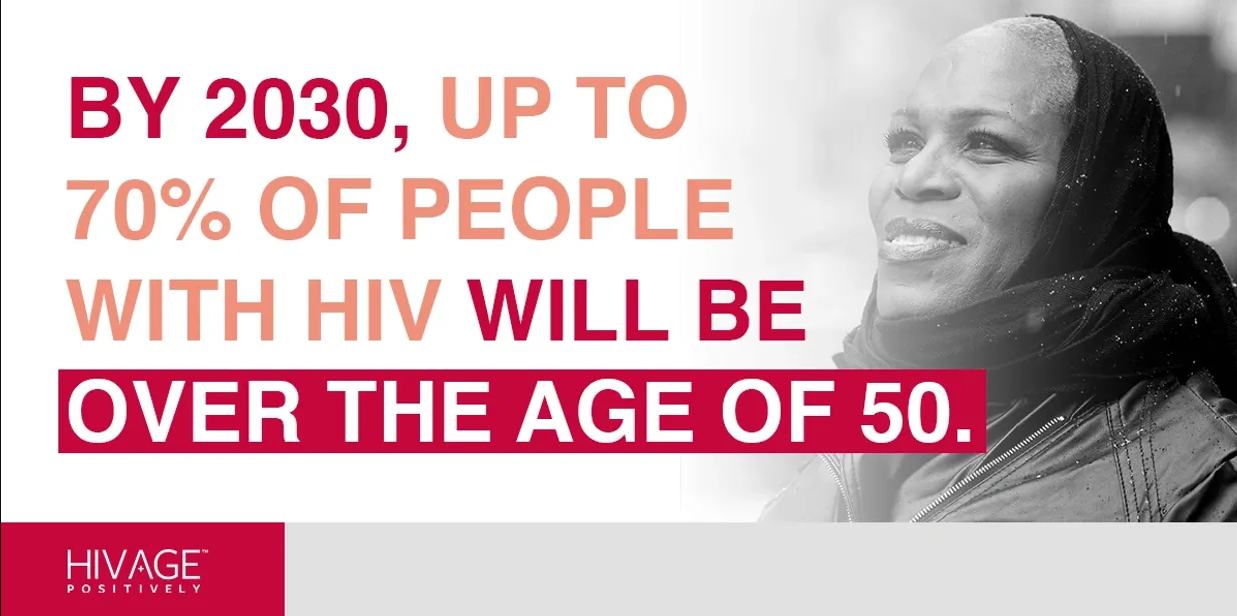
SAN FRANCISCO, Calif. – Vince Crisostomo was told he was not going to live past 30. And then 32. And then 34. Now, at 63, Vince serves as the Director of Aging Services at the San Francisco AIDS Foundation, spearheading initiatives supporting the growing population of individuals aging with HIV, many of whom, like himself, never expected to reach old age.
Thanks to groundbreaking innovations in HIV care and treatment, more than half of U.S. adults living with HIV today are over 50. By 2030, that number is estimated to increase to nearly 70 percent – a figure that was unimaginable 30 years ago. This transformation is a tremendous step forward, but has also meant that current models of care are largely unequipped to support a new, aging population with distinct care and treatment needs.
Individuals aging with HIV may face different challenges than other aging individuals. Medically, people living with HIV are more likely to develop age-related conditions like cancer or heart disease. Socially, older individuals with HIV are less likely to access supportive services due to isolation, lack of social networks and a healthcare system unprepared to meet their needs. Many long-term survivors also face financial insecurity, having not saved for a retirement they didn’t foresee. While networks of friendships and social companionships are integral to sustaining people as they age, many survivors have also lost friends to the epidemic that might have otherwise taken care of them.
“Obviously, it’s important to improve healthcare outcomes for everybody. Our current system is in need of a huge overhaul,” says Crisostomo. “But for individuals aging with HIV, it sometimes feels like providers didn’t get the memo that individuals with HIV are equal and recognized. It feels like a throwback. It can be a little traumatizing.”
Recognizing these gaps, Gilead launched HIV Age Positively® in 2019, a grant program aimed at supporting community-based organizations focused on improving the quality of life and health for older Americans aging with HIV. Over the past five years, the initiative has awarded more than $35.8 million in grants to support 42 organizations working to address stigma, loneliness and better coordination of care for impacted individuals.
One HIV Age Positively grant recipient is Crisostomo’s department. Aging Services at the San Francisco AIDS Foundation houses 50-Plus which is one of the oldest HIV & Aging programs in the country, providing personal share and support groups, social activities and volunteer opportunities for gay, bisexual and Trans men aged 50 and older as well as other programs. Under Crisostomo’s leadership, the services have become a lifeline for older residents aging with HIV, creating vital social connections and providing a sense of community to over 500 active members. But Crisostomo’s vision extends far beyond the Bay Area
In 2020, along with advocates Paul A. Aguilar, Harry Breaux, Michael Rouppet and Hank Trout, Crisostomo created the San Francisco Principles 2020– a response to the seminal HIV rights statement Denver Principles of 1983 – to elevate the voices of long-term HIV survivors and call for their inclusion in shaping policies and care models. “It’s a conversation, a call to action and a reminder that we’re still here,” Crisostomo explains. “Among long-term survivors, we often say ‘nothing about us without us’. You don’t become irrelevant after 50 –we deserve a place at the table.”
The Principles sparked a significant response, with over 400 people around the world signing up to support the message. In May 2022, the San Francisco Board of Supervisors officially endorsed the document, which Crisostomo hopes will drive a “happier ending” for long-term survivors.
“We didn’t live through this epidemic only for things to get worse,” says Crisostomo. “We understand that this work might not benefit us. But it will hopefully benefit future generations.”
Critical support comes from initiatives like Gilead’s HIV Age Positively, one of the few U.S. initiatives funding HIV and aging work. These grants support programs that help survivors “age with grace and dignity,” Crisostomo says, and crucially, elevates those most impacted.
“As our generation passes away, people aren’t going to remember what happened,” Crisostomo shares. “This part of the history will be gone. And it’s a part of our history that needs to be known so we don’t repeat it. Those of us aging with HIV need to lend our voices, otherwise someone else will write the story and it won’t be the story we lived.”
HIV AGE POSITIVELY, GILEAD, the GILEAD Logo, are trademarks of Gilead Sciences, Inc., or its related companies. All other marks are the property of their respective owners.
© 2024 Gilead Sciences, Inc. All rights reserved.
Sponsored
Women and HIV: A Deeper Look at Today’s Needs and Tomorrow’s Path to a Cure
Misconceptions around HIV continue to play a major role in hindering women, both cisgender and transgender, from knowing their HIV status

By Deborah Wafer | FOSTER CITY, Calif. – As the HIV epidemic has evolved, so too has our approach to HIV care to ensure we’re meeting the needs of a broad range of people impacted by the virus.
At the outset of the HIV epidemic, women’s health—especially the health of women of color—was often overlooked. But a tremendous amount of progress has been made to ensure women are getting the care and support they need. I’m grateful for our many community partners who are leading these conversations, as they are key to informing our efforts in HIV treatment and prevention research.
Recently, I had the opportunity to sit down with Natalie Sanchez, MPH, Director of the UCLA Los Angeles Family AIDS Network, to talk about our shared passion for addressing HIV as long-time advocates for women’s health and what it will take to end the HIV epidemic.
Deborah Wafer, PA, RNP: We’ve been privileged to live through tremendous innovations in HIV over the years that have significantly changed the course of the epidemic. Thinking back on my time working as a nurse practitioner in the 90s, I vividly remember the weight that an HIV diagnosis carried for so many.
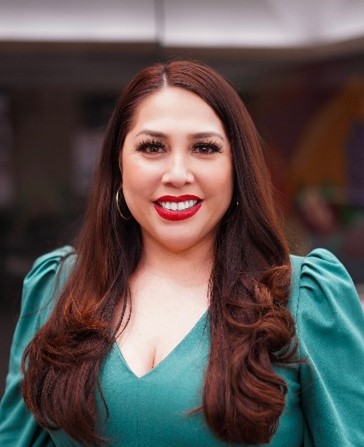
Natalie Sanchez, MPH: I completely agree. I’ve been working in the HIV space in Los Angeles for around twenty years now, and I am amazed at the progress we’ve made in HIV treatment and prevention. Yet, my role has given me a front-row seat to the unmet needs that are hindering our efforts to help end the HIV epidemic. One group that continues to be deeply affected by the virus but is not often at the forefront of these conversations is women—in particular, women of color. We know that in 2021, nearly one in five new HIV diagnoses in the US were among women, and the majority were among women of color, with Black and Hispanic/Latine women representing a combined 72% of new HIV diagnoses.
Deborah Wafer, PA, RNP: Yes, I know it continues to be an immense challenge to ensure women are not overlooked in this space.
Natalie Sanchez, MPH: What is also troubling is that the latest data from 2019 showed a disproportionate impact of perinatal HIV diagnoses among Black and Hispanic/Latine communities in the US. If we truly want to overcome the HIV epidemic, we need to ensure that women are prioritized in our research and advocacy efforts, so that we are effectively tackling any existing barriers and providing the holistic care they need and deserve.
Deborah Wafer, PA, RNP: We know that holistic care can only be truly comprehensive if we’re also addressing the other factors that may impact a woman’s journey with HIV. Women affected by HIV face unique challenges in accessing necessary care, such as racism, discrimination, and HIV-related stigma that can prevent some women from seeking HIV testing, treatment, or prevention services. Recognizing and breaking down these barriers will play a critical role in helping improve health outcomes for women affected by HIV.
Natalie Sanchez, MPH: I think one of the most significant barriers that you mentioned is stigma—something that is unfortunately still so evident today. Misconceptions around HIV continue to play a major role in hindering women, both cisgender and transgender, from taking the first step toward knowing their HIV status and getting the care they need. Unfortunately, women who don’t know they have HIV are often unable to access the treatment they need. This can lead to a higher likelihood of transmitting HIV to others and ultimately can hinder our progress in ending the epidemic.
Deborah Wafer, PA, RNP: Combatting the misconceptions around HIV is a critical component of our efforts, yes. The other piece comes in with research and clinical development. Ending the HIV epidemic will require substantially greater inclusion of women in clinical research, as women, particularly women from racial and ethnic groups underrepresented in research, young women, and transgender women, remain disproportionately affected by HIV. We must prioritize engaging women in the conception stage all the way through the execution of clinical studies to ensure that the medicines we’re delivering are effective for a broad range of people with HIV, regardless of their phase of life or experiences. In the late 90s, I had the opportunity to be a part of a clinical study of pregnant women with HIV—something that was not very common at the time—that helped determine the potential of mother-to-child transmission of HIV could be reduced by nearly 70% if HIV treatment was given to the mother during pregnancy and labor and delivery, and to the newborn. While this type of HIV transmission has declined by more than 95% in the US since the early 1990s, pregnant women with HIV still remain underrepresented in clinical trials.
Natalie Sanchez, MPH: I have also been greatly encouraged by the advancements made in HIV treatment research since the height of the epidemic. I’ve had the opportunity to support women through their initial HIV diagnosis, first pregnancy, and birth post-diagnosis, as well as subsequent pregnancies. And, I welcome that there are now options available for a person to remain on HIV treatment during pregnancy, which can be determined via consultation with their healthcare provider. Another exciting recent advancement was the guidance from the Centers for Disease Control and Prevention (CDC) supporting women’s choice to breastfeed, in accordance with discussions with their providers and with a sustained undetectable viral load and antiretroviral therapy adherence. I’ve heard women express how meaningful such updates have been to remain confident in their HIV treatment plans and help connect with their newborns.
Deborah Wafer, PA, RNP: Yes, the fact that we are seeing the guidelines from the CDC and the US Department of Health and Human Services (DHHS) updated and the FDA recognizes more clinical data around the safety and efficacy of HIV treatments for pregnant women is truly exciting. But we can’t stop here. There is still much more work to be done, which is one of the reasons I came to Gilead in the first place. Gilead has prioritized person-centric research in HIV since the very beginning, working directly alongside the community to spearhead many of the innovations that have helped transform HIV care into what it is today. But beyond that, our researchers truly have a passion for health equity and are dedicated to providing communities in need with access to innovative HIV treatment and prevention medications, including women.
Natalie Sanchez, MPH: We know that ending the HIV epidemic will require significant collaborative efforts from all of us, including leading partners like Gilead, community advocates, researchers, healthcare professionals, government officials, and more. To me, stable HIV diagnoses in women are not progress. More efforts need to, and will, focus on reducing new HIV diagnoses in women, beginning with prevention. In doing so, we are ensuring that everyone impacted by HIV, including groups that have historically been underrepresented in research like women, remain at the center of our conversations, innovations, and collective efforts to end the HIV epidemic once and for all.
******************************************************************************************
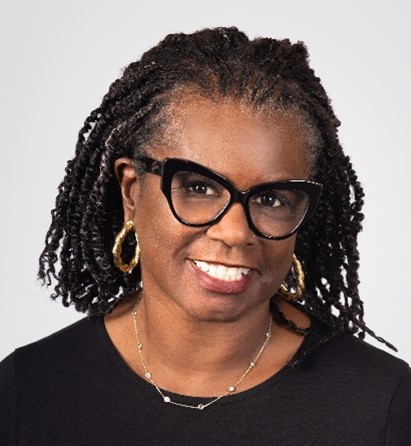
Deborah Wafer, PA, RNP is the Senior Director, Public Affairs, US Virology Community Engagement and Advocacy for Gilead Sciences.
******************************************************************************************
GILEAD and the GILEAD Logo are trademarks of Gilead Sciences, Inc., or its related companies. All other marks are the property of their respective owners.
© 2024 Gilead Sciences, Inc. All rights reserved. US-UNBC-2154 05/24
Sponsored
GLAAD’s Equity in Media and Entertainment Initiative Spotlights Black LGBTQ+ Creatives in Entertainment
EMEI is part of Gilead and GLAAD’s ongoing partnership to address disparities and advance equity across all areas of life for the LGBTQ+ community

By Edwina Eyre | LOS ANGELES – Victor Jackson always knew he wanted to be involved in the arts. As the oldest of four children whose parents met in college choir, Victor grew up dancing, singing and performing around his house in College Park, Georgia.
Three decades later, it’s no surprise that he’s making a name for himself as a multi-hyphenate – choreographer, creative director and musician – and more recently, one of the 10 individuals selected for GLAAD’s 2024 cohort for the Equity in Media and Entertainment Initiative (EMEI), a program focused on spotlighting talented LGBTQ+ music artists of color and highlighting their valuable contributions to the music and entertainment scene.
Launched in 2022, EMEI is a pipeline program aimed at addressing existing representation gaps within the entertainment industry by shining a spotlight on queer creatives who are driving culture in media. The program was created by GLAAD’s Communities of Color & Media department, and is supported by Gilead Sciences – individuals selected for the cohort receive a $10,000 stipend to support their creative ventures, in addition to assistance building professional connections.
Victor first heard about EMEI from friends who were involved in the inaugural cohort focused on Black LGBTQ+ filmmakers. The first year of the initiative was a huge success – the 10 chosen grantees attended monthly professional development meetings, fireside chats, panels, networking events and GLAAD’s inaugural Black Queer Creative Summit to foster networking and career development opportunities. Each member of the cohort also received direct funding to complete a short creative project.
“I saw how the first year of EMEI allowed my friends in the cohort to expand their creative work through new opportunities and funding,” said Victor. “I’d also worked closely with GLAAD on other projects, and was aligned with their advocacy in LGBTQ+ media. So when they announced that EMEI’s second year was going to be focused on musicians, I started becoming very intentional in my visualization for myself.”
This visualization worked, and Victor was chosen to be a part of the 2024 EMEI cohort, along with 2am Ricky, Albanus Thierry, Asiahn, Damez, Mylah Muse, Neverending Nina, SHAH, Siaira Shawn and Suni MF. So far, the group has joined the NFL and GLAAD in Vegas for “A Night of Pride” during Super Bowl weekend.
They also attended the inaugural Academy Proud event during GRAMMY weekend. In March, Victor performed his original music at #GLAADhonors at El Rey Theater in Los Angeles, California – a space where he’d previously choreographed shows for other musicians.
“A lot of organizations will provide funding and that will be it,” said Victor. “EMEI goes one step further by not only giving us the funding, but also providing the footing to stand in these commercial spaces as our independent, authentic selves.”
Perhaps even more important than opportunity, EMEI has provided a community. The 2024 cohort has a groupchat where they uplift and support each other’s work. They’re even in touch with many artists from the first filmmaking cohort, who have offered to help direct and produce music videos for the titles they’re working on.
“Being an independent artist can be lonely,” says Victor. “You don’t have a team or a huge machine behind you. It’s you on your computer, in the studio and behind the camera. Being a part of the EMEI cohort has given me a family of independent artists who look and love like me.”
EMEI is part of Gilead and GLAAD’s ongoing partnership to address disparities and advance equity across all areas of life for the LGBTQ+ community and those diagnosed and impacted by the HIV epidemic. Since 2018, the two organizations have collaborated to promote LGBTQ+ advocacy and tackle HIV stigma through a multi-year, multi-platform and multi-movement alliance focused on sparking global conversations about health equity and allyship.
Victor just released a new single, April Showers, which you can stream here.
Sponsored
Gilead’s TRANScend® Community Impact Fund helps break down barriers to HIV care and treatment for Transgender individuals
Although TDOV has come and gone, it’s important to continue recognizing the barriers to equitable care facing Transgender Americans
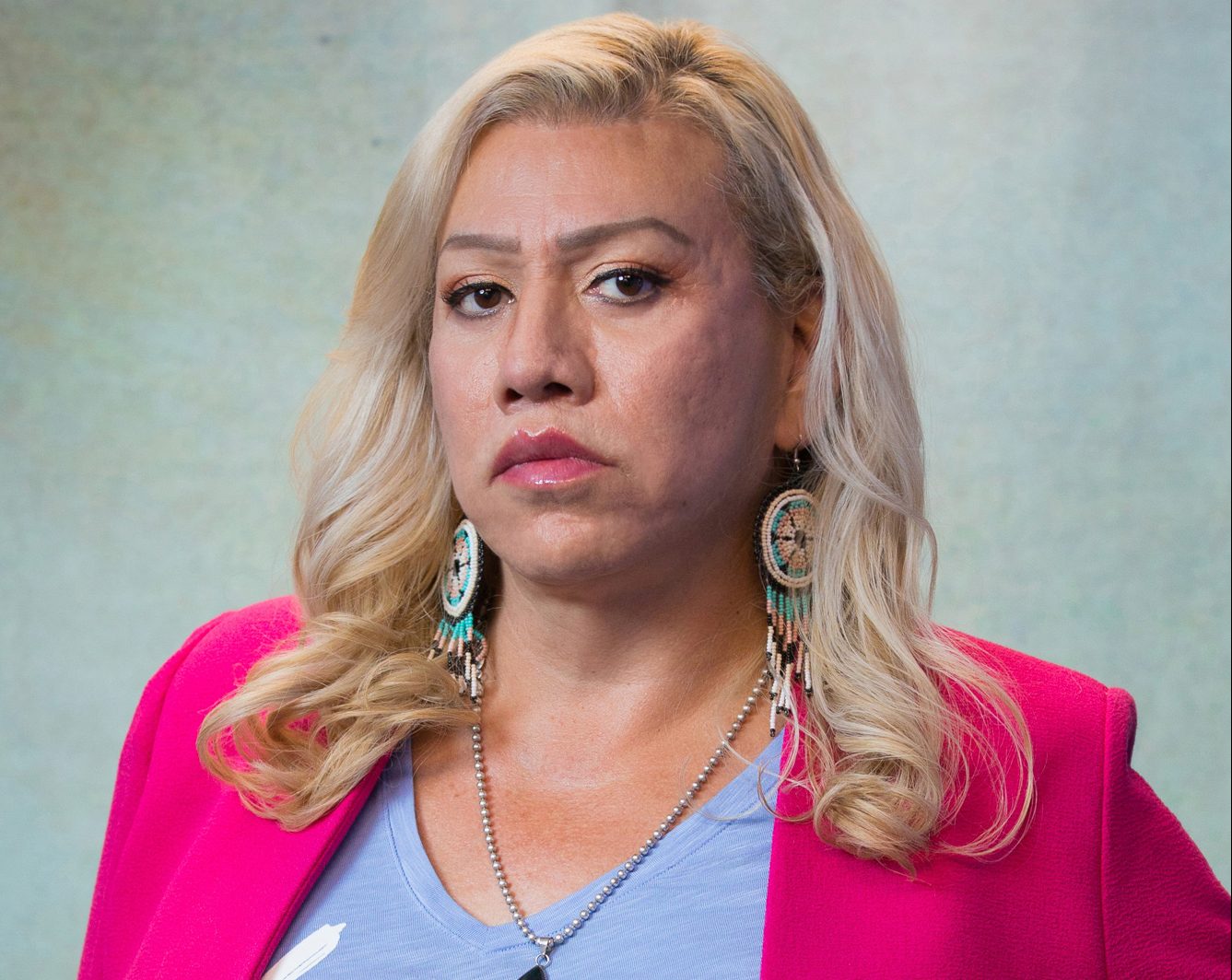
By Edwina Eyre | LOS ANGELES – On Sunday, communities around the world commemorated Transgender Day of Visibility (TDOV), an international day of recognition that lifts up the valuable contributions of Transgender individuals while acknowledging the work left to be done to eradicate systemic inequalities facing this community.
While TDOV is a time to celebrate the Transgender community, these individuals continue to face significant social and structural barriers when trying to access quality health care and treatment globally.
These barriers are especially prevalent when it comes to the HIV epidemic. Today, Transgender individuals in the United States experience disproportionately high rates of HIV compared to cisgender peers, an alarming trend that’s exacerbated by stigma and transphobia. The rate of Transgender Americans living with HIV is four times higher than the rate of cisgender Americans living with HIV. Additionally, the 2022 U.S. Transgender Survey – the largest survey of its kind to be conducted in the U.S. – found that 24% of survey respondents did not see a doctor when they needed to in the last 12 months due to fear of mistreatment. These disparities are even more severe when it comes to Transgender communities of color, who face compounding health inequities like racism and discrimination in the context of the epidemic. A staggering 62% of Black Transgender women live with HIV, compared to 35% of Latina and 17% of white Transgender women.
“The Transgender community is one of beauty and hope, yet Transgender individuals continue to face barriers when it comes to accessing quality HIV care and treatment,” says Jane Stafford, Executive Director of Public Affairs at Gilead Sciences. “Never has there been a more critical time for advocates, leaders and allies to join together and advance equitable HIV health outcomes for Transgender people, and we know that the best ideas for addressing lasting health equity obstacles come from the ingenuity of people who are creating change at the local level.”
In 2018, Gilead convened an Advisory Board with experts and community advocates from Transgender advocacy and healthcare organizations to learn where deep investments were needed to support the Transgender community. Gilead launched the TRANScend Community Impact Fund in 2019 directly out of these conversations, an initiative aimed at supporting Trans-led and serving organizations working to improve the safety, health and wellness of the Transgender community. Since its inception, the program has provided over $9 million to 26 organizations across the country to support grantmaking, capacity building and direct services. In its second phase alone, the fund has reached over 10,000 Transgender individuals through its support of grantee programming, including training, service provision and linkage to care.
One of these grantees is The Translatin@ Coalition, a national advocacy organization based in Los Angeles, California focused on supporting the Trans Latinx community in the United States. Founded in 2009 by advocate and community organizer Bamby Salcedo, the organization works to empower the Trans Latinx community through service provision, and influence change at an institutional level through state and federal policy work.
“At The Translatin@ Coalition, we believe that we can’t address the HIV epidemic without first addressing structural and social needs at an individual level,” said Salcedo. “By ensuring access to essentials like food, housing and workforce development, we can significantly diminish the impact of HIV within our community.”
The Translatin@ Coalition’s commitment to holistic service provision goes beyond food, housing and employment. The organization provides a comprehensive array of support services aimed at addressing the social determinants of health for Transgender individuals, including reentry services, support for those exiting incarceration or immigration detention, programs tailored for aging Transgender individuals, legal assistance, violence prevention services and a multitude of other initiatives designed to uplift and support the livelihoods of the Los Angeles Transgender community.
“As someone who themselves has been directly impacted by the social determinants of health, including the carceral system, homelessness and violence, and who has had the privilege of reforming my own life, I understand that I also have a responsibility to my community, and to uplifting and empowering those who are in similar situations,” said Salcedo. “We’re grateful for the support of the TRANScend Community Impact Fund, which not only supports Trans-led organizations but also empowers Trans individuals as a whole.”
Although TDOV has come and gone, it’s important to continue recognizing the barriers to equitable care facing Transgender Americans while supporting impactful, Trans-serving organizations like The Translatin@ Coalition. True HIV prevention can’t be just a one-time affair – it’s a continuous commitment to dismantling the structural and social foundations still contributing to lasting health inequities for Transgender individuals and other vulnerable communities across the country.
Sponsored
HIV (Should Not Be) a Crime
HIV Is Not A Crime Awareness Day, held on February 28, draws attention to the more than 30 U.S. states that continue to criminalize HIV
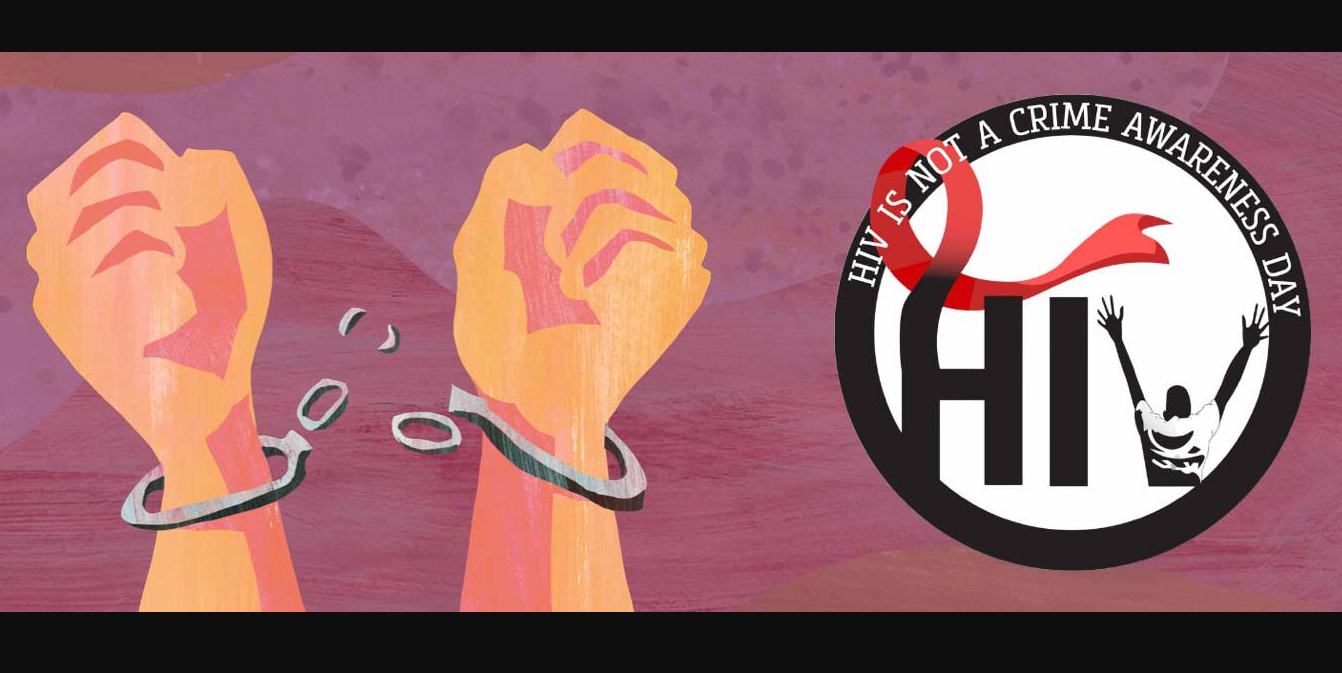
By Liz Brown | NEW YORK – On New Years Eve in 2007, Robert Suttle met a man and very quickly, the two hit it off. That night, Suttle had worked up the courage to tell the man his truth: he was living with HIV. This did not deter the man from casually dating Suttle, but about three months later, they broke up and went their separate ways.
Months after the split, police officers showed up unannounced at Suttle’s place of work and arrested him on the spot. His crime? Suttle’s former partner claimed he had never disclosed his HIV status before they had sex, which is illegal in Louisiana under the “Intentional Exposure to HIV” statute. In other words, Suttle was criminalized for being diagnosed with HIV. Because of this unjust and discriminatory offense, Suttle was sentenced to six months in prison in 2010 and had to add his name to the Louisiana sex offense registry, where it still remains a requirement for him today as a resident of New York state until 2034.
Suttle’s story is one of several featured as part of HIV Is Not a Crime, a campaign championed by The Elizabeth Taylor AIDS Foundation, and funded through support from Gilead Sciences, the nation’s number one overall philanthropic funder of HIV-related programs in 2021 (the most recent yearly data available) according to Funders Concerned About AIDS. The HIV Is Not a Crime campaign advocates for the modernization of laws that criminalize people, like Suttle, who are living with HIV.
While Suttle’s story is heartbreaking, it is not unique. People living with HIV are unfairly charged and branded as criminals in 34 states. These draconian laws were enacted during the height of the HIV epidemic in the 1980s when a diagnosis was considered a death sentence. Today, innovative scientific breakthroughs and advances in treatment have led to millions to live longer, healthier lives, and HIV being successfully suppressed to the point of it being undetectable. And yet, in too many states, HIV is still a crime.
These laws are not only unjust, but also do nothing to curb the ongoing epidemic. In fact, the U.S. Centers for Disease Control and Prevention (CDC) found that criminalizing HIV exacerbates already existing stigma and discourages people from getting tested, finding treatment and disclosing their status.
That’s why it’s still important to recognize HIV Is Not A Crime Awareness Day on February 28, an annual awareness day focused on uplifting the voices of those who have been criminalized based on their HIV status. This day falls at the end of Black History Month, which underscores the need to additionally amplify the troubling disparities impacting Black Americans and HIV criminalization. Black people are disproportionately impacted by the HIV epidemic, and face numerous barriers to care, structural racism, poverty, language barriers, homophobia and more. Anti-Black racism in particular fosters high levels of inequities in both the U.S. healthcare and criminal justice systems, which further exacerbate the disproportionate burden of HIV and over-criminalization of the Black community. In Louisiana, where Suttle lived and was arrested, Black men account for more than 90% of HIV-related arrests, despite only making up just 15% of the state’s population. Understanding which communities are most impacted and why, is key to not only ending the epidemic, but also removing these unjust laws from the books.
HIV Is Not A Crime Awareness Day is also the time to celebrate the incremental progress that’s been made in many states: Missouri, Nevada, Nevada and Virginia have modernized their HIV criminalization laws; and Texas deleted this statute from its code in 1994, New Jersey and Illinois have fully repealed their HIV-specific laws. Over the last couple of years, progress has been swift. Since 2020, four of these states – Nevada, Illinois, New Jersey and Virginia – have instituted sweeping reforms that include removing sex offender registration from the criminal code, removing discriminatory sentencing that targets sex workers and requiring proof that the person with HIV was intentionally trying to transmit the virus.
Thanks to the work of advocates like Suttle, and organizations like The Elizabeth Taylor AIDS Foundation and Gilead, a growing number of Americans living with HIV are also not living in fear of prosecution.
Today, Suttle lives in New York City and remains a passionate HIV decriminalization advocate. “I want to provide that safe space and share my story to offer people solidarity and hope,” Suttle explained in a Stories@Gilead interview from 2021. “I have seen this movement of HIV decriminalization grow and evolve, more than any of us could have imagined. It’s amazing to support it by telling my story.”
GILEAD and the GILEAD Logo are trademarks of Gilead Sciences, Inc. All other marks are the property of their respective owners. © 2024 Gilead Sciences, Inc. All rights reserved.
Sponsored
New Gilead Initiative Aims to Empower Organizations Tackling the HIV Epidemic for Black Women in the United States
Gilead‘s three-year, $12.6 million commitment will increase HIV prevention and health equity efforts for Black women and girls
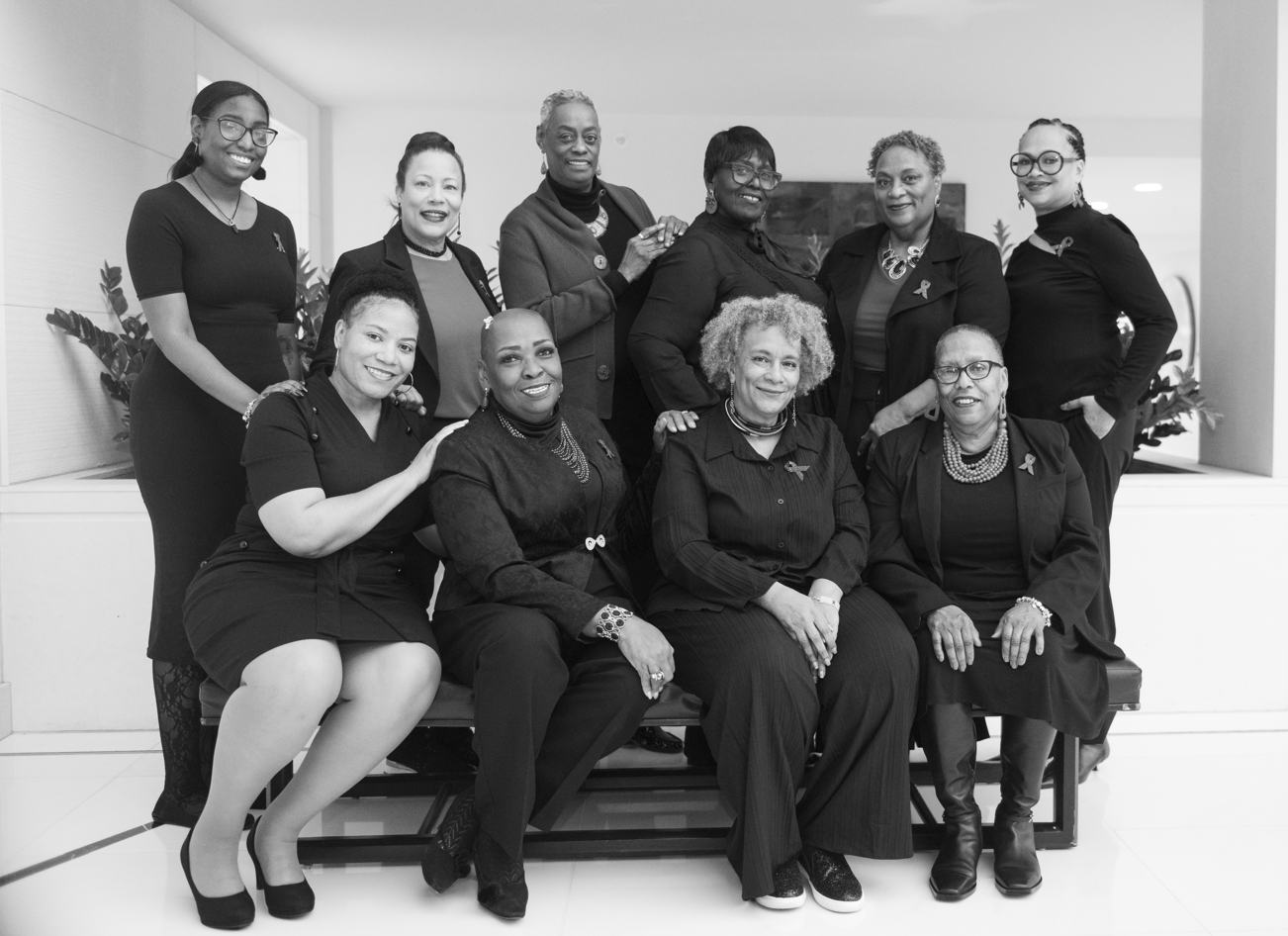
By Edwina Eyre | CALABASAS, Calif. – In the rapidly-evolving public health landscape, one stark reality has remained constant: Black cisgender and Transgender women bear a disproportionate burden of the HIV epidemic. Black women, who constitute only 14% of the female population in the United States, accounted for a staggering 53% of new HIV diagnoses among women aged 13 and older in just 2021 alone.
Additionally, Black Transgender women have the highest rates of new HIV diagnoses among Transgender people and are more likely to go undiagnosed and untreated in comparison to their peers.
Although medicines like PrEP and PEP can help mitigate these disparities, structural and social factors like stigma, discrimination and economic inequality coupled with significant gaps in the delivery of culturally-competent HIV prevention information and care continue to exacerbate poor health outcomes for Black women and girls impacted by HIV.
“Since the start of the epidemic 40 years ago, Black women have borne the brunt of annual HIV diagnoses and premature deaths, largely due to the social determinants of health that impact us long before we even get a diagnosis,” said Vanessa Johnson, Co-Executive Director at Ribbon – Center of Excellence, a nonprofit providing support for individuals in need of services for HIV and chronic diseases. “Black women are the caretakers of our communities, but structural and social barriers like poverty, violence and trauma continue to fuel disparities within HIV outcomes, which disproportionately impact us more than any other population group.”
Last year Gilead Sciences launched the Setting the P.A.C.E. (Prevention, Arts and Advocacy, Community, Education) Initiative to help address these critical issues. This three-year, $12.6 million commitment is aimed at increasing HIV prevention, anti-stigma and health equity efforts for Black cisgender and Transgender women and girls in the United States.
“At Gilead, we know that we cannot end the HIV epidemic if we do not prioritize the needs of
Black women and girls,” said Carmen Villar, Vice President, Public Affairs, Gilead Sciences. “The Setting the P.A.C.E. Initiative tackles barriers to care head-on by supporting high-impact organizations working to improve the HIV landscape for impacted individuals.”
Setting the P.A.C.E focuses on empowering Black women led- and serving organizations on the front lines of this epidemic, providing them with the tools and resources needed to rewrite the narrative on HIV care and treatment. Through its four key focal points –Prevention, Arts and Advocacy, Community and Education – the program seeks to support projects tackling HIV health barriers for Black women and girls, from expanding programs that provide culturally-responsive HIV care training to leveraging arts and media to engage local communities and address stigma.
Ribbon – Center of Excellence is one of the 19 grantees that will receive the first round of Setting the P.A.C.E. funding. With support from Gilead, Ribbon will provide capacity-building assistance to other grantee organizations and non-funded groups servicing cisgender and Transgender Black women, focusing their support in the areas of policy, advocacy and convening.
“Setting the P.A.C.E. will allow us to build a network of groups working to advance HIV health equity for Black women and girls, and foster convening spaces for these organizations,” said Linda H. Scruggs, Co-Executive Director at Ribbon. “There are a lot of organizations working toward our same goals. Once we create multilevel partnerships at federal, state and individual levels, we can identify gaps in policy and funding, and work toward providing services and advocacy to meet these needs.”
The programs that are part of the Setting the P.A.C.E Initiative will be either nationally- or regionally- focused. Most importantly, more than 75% of the organizations selected for grants are led by Black women and every funding allocation is directed toward initiatives spearheaded by Black women.
“Black women are stepping up to lead HIV advocacy and response programs across the country,” said Scruggs. “For the first time, we are building the resources and creating the opportunity to forge new paths toward fixing, healing and protecting our own community. There’s no reason why another generation of Black women, cis or Trans, should be casualties of the HIV epidemic in the years to come.”
-

 Breaking News4 days ago
Breaking News4 days agoMajor victory for LGBTQ funding in LA County
-

 Features4 days ago
Features4 days agoKoaty & Sumner: Finding love in the adult industry
-

 Commentary2 days ago
Commentary2 days agoBreaking the mental health mold with Ketamine: insights from creator of Better U
-

 Miscellaneous3 days ago
Miscellaneous3 days agoCan you really find true love in LA? Insights from a queer matchmaker
-

 El Salvador4 days ago
El Salvador4 days agoLa marcha LGBTQ+ desafía el silencio en El Salvador
-

 Arts & Entertainment3 days ago
Arts & Entertainment3 days agoIntuitive Shana gives us her hot take for July’s tarot reading
-

 Movies8 hours ago
Movies8 hours agoTwo new documentaries highlight trans history







